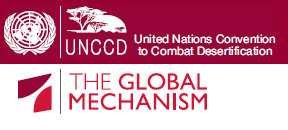A high-level event organized by the Italian Ministry of Foreign Affairs and International Cooperation (MFA) has emphasized the role of land restoration in reducing global threats and securing the livelihoods of communities affected by land degradation.
Speaking at the event, UN Convention to Combat Desertification (UNCCD) Executive Secretary Monique Barbut stressed that populations in affected areas “are simply running out of coping mechanisms locally,” and that under such circumstances “migration is one way out… extremism and conflict is another.” Executive Secretary Barbut also opened the Third Meeting of the UNCCD's Intergovernmental Working Group (IWG) that is developing a common definition of Land Degradation Neutrality (LDN) and possible options for its implementation as part of the follow up to the UN Conference on Sustainable Development (UNCSD or Rio+20).
 March 2015: A high-level event organized by the Italian Ministry of Foreign Affairs and International Cooperation (MFA) has emphasized the role of land restoration in reducing global threats and securing the livelihoods of communities affected by land degradation. Speaking at the event, UN Convention to Combat Desertification (UNCCD) Executive Secretary Monique Barbut stressed that populations in affected areas “are simply running out of coping mechanisms locally,” and that under such circumstances “migration is one way out… extremism and conflict is another.”
March 2015: A high-level event organized by the Italian Ministry of Foreign Affairs and International Cooperation (MFA) has emphasized the role of land restoration in reducing global threats and securing the livelihoods of communities affected by land degradation. Speaking at the event, UN Convention to Combat Desertification (UNCCD) Executive Secretary Monique Barbut stressed that populations in affected areas “are simply running out of coping mechanisms locally,” and that under such circumstances “migration is one way out… extremism and conflict is another.”
In her presentation, titled ‘Sustainable Management of Land: Reduce global threats, protect local resources,’ Executive Secretary Barbut outlined research that links “40% of all interstate conflicts over the last 60 years … with land and other natural resources.” Highlighting case studies from Lake Chad, the Sahel, Horn of Africa and Middle East regions, Barbut identified three key elements that should be part of the global response: stopping the loss of productive land and rehabilitating degraded land in order to achieve land degradation neutrality; promoting land-based adaptation and mitigation of climate change; and enhancing national and global water security.
Giampaolo Cantini, Director-General for Development Cooperation at the MFA underscored that “there can be no sustainable agriculture without wise use of land and land management,” and noted that the land-food nexus will be one of the main themes at the upcoming Expo 2015 in Milan.
The high-level event took place on 18 March 2015 in Rome, Italy, and was attended by more than 100 representatives from Italian governmental and non-governmental organizations, international organizations and country representations based in Rome. Barbut also used the event to thank the Italian Government for hosting the Rome-based ‘Liaison – Land, Security and Resilience’ (LLSR) Programme. Supported by the Liaison Office of the Global Mechanism (GM) of the UNCCD and the Food and Agriculture Organization of the UN (FAO), the LLSR Programme aims to increase investments in sustainable land-based practices to improve people’s livelihoods and the resilience of local communities, while maintaining healthy ecosystems and contributing to land-degradation neutrality.
In other related events in Rome, Executive Secretary Barbut opened the Third Meeting of the UNCCD’s Intergovernmental Working Group (IWG) that is developing a common definition of Land Degradation Neutrality (LDN) and possible options for its implementation as part of the follow up to the UN Conference on Sustainable Development (UNCSD or Rio+20). She was also invited to a hearing at the Italian Parliament and its Committee on Consultation on Emerging Issues, Challenges and new Prospects for Development in Sub-Saharan Africa. [Global Mechanism News Story] [LLSR Programme Website] [LDN Project Website] [3rd IWG Meeting Announcement and Programme] [IISD RS Story on Launch of LDN Project]